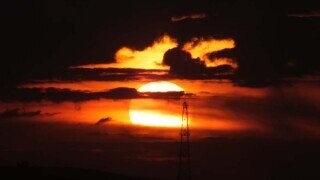The Doomsday Cult Leader (Who Got Booted From His Cult Town)

Back in the late ‘60s, people thought the world was soon going to end, just like they do today. To be fair, it’s always been pretty damn difficult to look around you without seeing how extremely unsustainable things are. Entropy, what a concept. But while some people will look at the world and ask themselves what they can do to better it, even just a little, others will believe that they’re the reincarnation of some ancient Pharaoh put here on Earth to save humanity from impending doom.
That up there is former Chicago engineer Richard Kieninger, who wrote a third-person autobiographical book in 1963 called The Ultimate Frontier. In it, he claimed that, as a child, he was visited by someone from the “Brotherhood” who gave him ice cream and told him that he was once everyone from Egyptian Pharaoh Akhenaten to King David. It sounds like if the plot of Hereditary was even more disturbing.

The Stelle Group
According to Kieninger, this “Dr. White” character then told him to construct some kind of Noah’s Ark based on self-reliant principles and the Golden Rule because the world was going to end on May 5, 2000, thanks to major tectonic shifts caused by some solar planetary configuration that will bring everything from floods to erupting volcanoes to Cthulhu rising from the ocean. Okay, he didn’t say that last part, but that’s definitely how the movie should go.
Don't Miss
In 1973, Kieninger and a small hippie-following -- who, of course, had to transfer all their assets to him -- established themselves in the small township of Stelle, Illinois, with the sole purpose of erecting a sustainable community that could outlive the apocalypse. At least that was the official purpose statement because it took only two years for the newly-found townsfolk to kick Kieninger out of his own idealistic utopia. See, apparently, utopia meant plunging women back into the Dark Ages for Kieninger. They were not allowed to wear pants, and if they had kids, they couldn’t work outside of their homes. Men were required to wear ties and suits at all times in public, even if they were on their way to their construction jobs. Top that with typical cult-leader shenanigans of sleeping with every other woman in town, and the folks of Stelle soon realized that Kieninger’s ideals weren’t what they had signed up for and, instead of defecting or simply moving away, they voted for him to go.
The disposed Kieninger would then go on to find a sister-town based on the same “Brotherhood” principles in Adelphi, Texas, saying that a mysterious “John” character led him there to cover up the fact that he was rejected by his own failed cult. Hilariously, the Adelphi Organization would later sue Kieninger to be removed as a trustee, proving that while these communities were invested in some of his societal ideas, they weren’t buying his greater intentions and leadership qualities. The guy lacked the charm we so often see in (successful) cult leaders, and while he had progressive notions of how society should live a more green, sustainable existence, many of his ideas were backward. For example, he didn’t want to allow any vegetarians to come and live in Adelphi because, according to him, they lacked the stamina “to do much of anything.”
It would also not surprise anyone that Kieninger was later charged and served time for distributing fraudulent cashier's checks because people who want others to believe that they’re immortal beings tend to do whatever the hell they want. If only Kieninger’s “followers” had rubbed off on him more because the people of Stelle were able to largely dismiss his apocalyptic prophecies and focus on being an eco-friendly community. Stelle became the first U.S. town to incorporate a solar-powered telephone company and use a solar-powered wireless internet service. They have a free and open attitude toward different religions and philosophies, provide communal dinners at least once a week, implement community-based living through things like tool-sharing and gardening, and have everyone involved in the town’s wind-powered water and sewer plants.
And there’s no mention of Kieninger or his Doomsday beliefs on their site, unlike the one for the Adelphi Organization.
Zanandi is on Twitter and wrote a comic for Trailer Park Boys that you can order here.